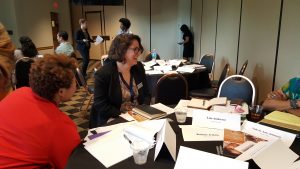By Britt Jenkins
Last month I had the opportunity to attend an eye-opening conference focused on issues affecting women and girls of color. Renowned political scientist and Duke alumna, Melissa Harris-Perry, a feminist scholar and director of the Anna Julia Cooper Center at Wake Forest University, organized the April 29th ‘Know Her Truths’ conference to kick off the Collaboration to Advance Equity through Research.
The Collaboration, initiated last fall at a White House Council on Women event, is a voluntary affiliation between universities, institutions and advocacy groups committed to addressing the deficits in research on women and girls of color. 
Participants in the two-day conference represented diverse gender identities, ethnicities, beliefs and backgrounds. This was an incredible gathering given that in the weeks prior, the North Carolina General Assembly passed the HB2 legislation that targeted many of the individuals and stakeholders in attendance, making the ‘Know Her Truths’ conference an affirming and important experience for many of us.
With the current political environment in North Carolina perpetuating discrimination by excluding the voices and visibility of entire groups of people, Dr. Harris-Perry began the conference with a definition of feminism.
Feminism, she said, is “when someone asks the question ‘what truth is missing?’” Dr. Harris-Perry’s message steered conference participants to critically examine what truths have been neglected. The conversation topics — such as bias in school discipline, grassroots advocacy strategies and the influence of stereotypes on reproductive healthcare — were bold, and encouraged us to challenge one another and be candid, resulting in a breath of fresh feminist air.
The panel discussion on school discipline disparities focused on how society criminalizes black girls. The panelists began with an overview of research that examined implicit biases in the discipline of black girls, but the conversation quickly transformed from an empirical discussion of disproportional impact to personal accounts.
Janel George, an attorney with the NAACP, recounted a time in elementary school when her teacher targeted her because he thought her voice was “too loud and grating,” an apt illustration of the “loud black girl” stereotype. An audience member responded, sharing her own experience of how the criminalization of young girls of color in school is often reinforced in the workplace. She said that she, like others in the room, had been accused by male co-workers of being too aggressive when confronting workplace discrimination.
If standing up against discrimination is perceived as aggressive, “what do I tell my daughters?” asked the woman.
It was apparent to me that the stereotype of the “angry black woman” is still a powerful and pervasive influence in the perception black women, even within professional settings. Of course no real answer could be determined, but the space provided an environment to affirm the perspectives and specific realities of the women who spoke.
____
My favorite panel at the conference featured members of the New Orleans non-profit Women with a Vision who specialize in grassroots “front porch” approaches to civil action post-Katrina. The organization, which was started in 1989 in response to the HIV health crisis, has been successful in providing outreach to the most neglected, including marginalized women, sex workers and their families. Their groundbreaking work led to a violent backlash. In 2012, their building was set on fire. Despite the hardships, Women with a Vision have continued to engender trust within communities and actively create relationships with their clients that elicit a sense of partnership and empowerment.
This spoke to me directly as a public servant and graduate student in public policy who has spent the majority of the last two years in a more sterile, academic environment. Often stakeholder voices are subverted in favor of empiricism and objective analysis, which inevitably leads to biases that can take away from the experiences of the people being most affected by a problem. It was beautiful to see the care and dignity Women with a Vision provided to clients who eventually became friends, allies and fellow collaborators.
The final breakout panel I attended included policy makers and advocacy leaders on reproductive healthcare measures. While the panel featured a conversation on abortion rights, it was quickly extended to a discussion on discrimination felt by women of color in all spheres of reproductive healthcare. Research has shown that African Americans are perceived to be able to endure more pain than other races, which has resulted in withheld pain treatments, limited reproductive healthcare options, and unnecessary pain and duress during labor.
At the end of a day full of powerful testimonies and truth-sharing, Dr. Harris-Perry addressed the room by directing a message to one young woman who had provided one such testimonial by saying, “We hear you, we believe you, we affirm what you say and we are proud of you.” The affirmation and acknowledgment of voice was the most important, empowering component of this conference. The conference reinforced for me that incorporating truths from a variety of perspectives is just as valuable as other forms of data. And it showed me how research and advocacy could blend together to create more informed, inclusive movements.
The conference provided a space for Collaborative members to network, share ideas, best practices and outcomes related to research and the lived experiences of women of color. As my work with the Collaborative, hosted by the Duke Council on Race and Ethnicity, continues this summer I look forward to facilitating this kind of truth telling about issues affecting women and girls of color on Duke’s campus and beyond.
Britt Jenkins, MPP, is a recent graduate of Duke University’s Sanford School of Public Policy with a research interest in reproductive rights. She currently works as a research assistant at the Duke Council on Race and Ethnicity.




